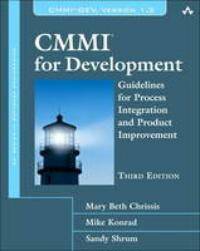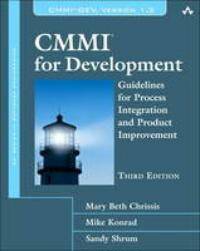
- Retrait gratuit dans votre magasin Club
- 7.000.000 titres dans notre catalogue
- Payer en toute sécurité
- Toujours un magasin près de chez vous
- Retrait gratuit dans votre magasin Club
- 7.000.0000 titres dans notre catalogue
- Payer en toute sécurité
- Toujours un magasin près de chez vous
CMMI for Development
Guidelines for Process Integration and Product Improvement
Mary Beth Chrissis, Mike Konrad, Sandra Shrum
83,45 €
+ 166 points
Description
CMMI(R) for Development (CMMI-DEV) describes best practices for the development and maintenance of products and services across their lifecycle. By integrating essential bodies of knowledge, CMMI-DEV provides a single, comprehensive framework for organizations to assess their development and maintenance processes and improve performance. Already widely adopted throughout the world for disciplined, high-quality engineering, CMMI-DEV Version 1.3 now accommodates other modern approaches as well, including the use of Agile methods, Lean Six Sigma, and architecture-centric development. CMMI(R) for Development, Third Edition, is the definitive reference for CMMI-DEV Version 1.3. The authors have revised their tips, hints, and cross-references, which appear in the margins of the book, to help you better understand, apply, and find information about the content of each process area. The book includes new and updated perspectives on CMMI-DEV in which people influential in the model's creation, development, and transition share brief but valuable insights. It also features four new case studies and five contributed essays with practical advice for adopting and using CMMI-DEV. This book is an essential resource-whether you are new to CMMI-DEV or are familiar with an earlier version-if you need to know about, evaluate, or put the latest version of the model into practice. The book is divided into three parts. Part One offers the broad view of CMMI-DEV, beginning with basic concepts of process improvement. It introduces the process areas, their components, and their relationships to each other. It describes effective paths to the adoption and use of CMMI-DEV for process improvement and benchmarking, all illuminated with fresh case studies and helpful essays. Part Two, the bulk of the book, details the generic goals and practices and the twenty-two process areas now comprising CMMI-DEV. The process areas are organized alphabetically by acronym for easy reference. Each process area includes goals, best practices, and examples. Part Three contains several useful resources, including CMMI-DEV-related references, acronym definitions, a glossary of terms, and an index.
Spécifications
Parties prenantes
- Auteur(s) :
- Editeur:
Contenu
- Nombre de pages :
- 688
- Langue:
- Anglais
- Collection :
Caractéristiques
- EAN:
- 9780321711502
- Date de parution :
- 10-03-11
- Format:
- Livre relié
- Format numérique:
- Ongenaaid / garenloos gebonden
- Dimensions :
- 185 mm x 234 mm
- Poids :
- 1020 g

Les avis
Nous publions uniquement les avis qui respectent les conditions requises. Consultez nos conditions pour les avis.






